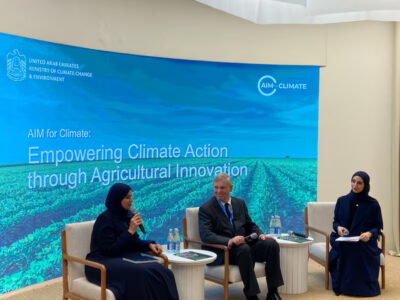Plans to harness high humidity to produce crucial rainfall for farmers in arid conditions are taking shape under a multibillion-dollar UAE-US partnership turning brainstorming into concrete climate solutions.
The high-tech project from US company Heka Cloud is one of several being developed with financial support from the Agriculture Innovation Mission for Climate (Aim for Climate) established by the Emirates and Washington to drive environmental action.
It was announced on Monday that project organisers had raised $29.2 billion since 2020 to support climate-smart agricultural projects. Aim for Climate now has more than 800 partners worldwide, with key funding from the private and public sectors.
The latest investments and partnerships were unveiled by Aim for Climate co-chiefs Dr Amna Al Dahak, Minister of Climate Change and Environment, and US Secretary of Agriculture Tom Vilsack at the UAE Pavilion at Cop29 on Monday.
Boosting water security
Shuang Chen, founder and chief executive of Heka Cloud, told The National that while the project is still in the pilot phase, it has the potential to track humidity and capture it to create up to 2mm of rain where needed for farmers.
Mr Chen said the technology aims to replicate nature, imitating the process similar to the formation of a thundercloud. “The technology, using electrical energy, can be powered by solar power. It’s using a high voltage to generate billions of ions and mimic the thunderstorm process,” he said. “When the ions touch the air, they quickly accelerate growth and create small-scale rain.”
According to Mr Chen, Heka Cloud’s AI-powered, humidity-harvesting system has the potential to provide a nature-based water solution to more than 90 per cent of the UAE.
By producing controlled rain, even in dry seasons, Mr Chen said the scheme could make a lasting impact on water and food security. “The key is that if we can precisely track the humidity, then we have the capability to the automate systems 24 hours a day. Whenever the situation is right, we can generate certain rains.”
In addition to providing a solution to support farmers in arid environments, Mr Chen said the project has the potential to generate millions of tonnes of carbon credits annually if applied in the UAE, which he said would support the nation’s net-zero goals.

Jaime Adams, who leads international agricultural science and technology issues for the US Department of Agriculture’s chief scientist, said the Aim initiative had put the needs of the agriculture industry into sharp focus.
“One of the biggest things we’ve seen with Aim for Climate is we have brought more ministers of agriculture to the table, made opportunity for more food and agriculture stakeholders to know about Cop, come to Cop for the first time over the last several years, and ensure that the voices of farmers are here and represented.”
Ms Adams said the announcement of the funds committed to Aim for Climate is critical on the back of this year’s focus on finance to tackle the climate crisis. She said what is needed now is for a greater focus on food and agriculture in national climate action plans.

The UAE has been at the forefront of efforts to embrace innovation and advanced technology to bolster water security for decades.
The country launched its cloud-seeding programme in the 1990s. By the 2000s, the National Centre of Meteorology was working with global peers such as Nasa and the National Centre for Atmospheric Research in the US to further develop seeding strategies.
Seeding is a complex process, with research pouring into the field to assess its effectiveness. But it essentially involves shooting salt flares or other small materials into clouds to try to generate extra rain. Hundreds of seeding missions are conducted each year in an effort to increase rainfall in the typically dry UAE climate.
The UAE’s Plant the Emirates campaign was launched last month by Sheikh Mohammed bin Rashid, Vice President and Ruler of Dubai, to boost the country’s agriculture sector and to help address food security issues.
The initiative involves setting up a national centre to promote domestic farming, with the aim of increasing agricultural production by a fifth in the next five years. Traditionally reliant on food imports, the UAE has more recently attracted significant investment in agricultural technology to increase its own output.



